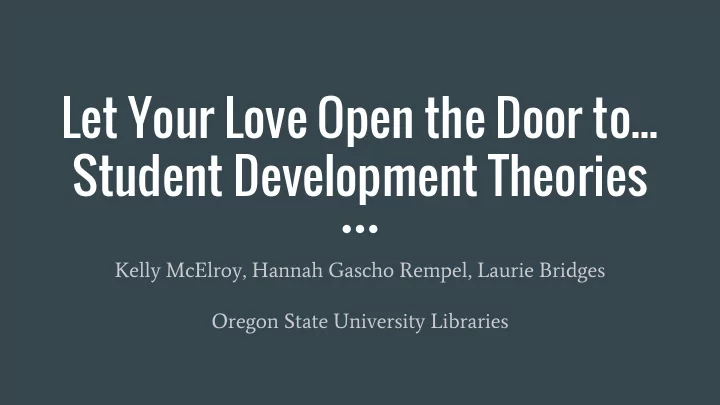

Let Your Love Open the Door to... Student Development Theories Kelly McElroy, Hannah Gascho Rempel, Laurie Bridges Oregon State University Libraries
Have you ever...
Learning Theories Kolb Adult Online
Kolb - Experiential Learning Theory
Online Course Development Recommendations 1. Easy to read large fonts. 2. Variety of graphics, images, tables. 3. Clear menu structure. 4. Search and find function. 5. Practice with feedback and self tests. 6. Provide context sensitive help function. 7. Ensure no cultural bias. 8. Use graphic organizers, Venn diagrams, concepts maps, and flowcharts. 9. Chunk information. (Cercone, K. 2008)
Learning Styles and Adults: Recommendations Students move through instruction at their own pace Students can review previous learning when they want Provide links to variety of web resources Ensure time to master content Address diverse learning styles in multiple modes: text, graphics, audio, manipulatives. (Cercone, K. 2008)
Psychosocial Theories How individuals develop and maintain their identity, answering the questions: who am I? who do I want to be?
Stages of psychosocial development (Erikson, 1950) Ego integrity vs. despair Generativity vs. stagnation Intimacy vs. isolation Identity vs. role confusion Industry vs. inferiority Initiative vs. guilt Autonomy vs. shame/doubt Basic trust vs. basic mistrust
Stages of psychosocial development (Erikson, 1950) “...primarily concerned with what they appear to be in the eyes of others as compared with what they feel they are.” Identity vs. role confusion
Stages of psychosocial development (Erikson, 1950) “Thus, the young adult, emerging from the search for and the insistence on identity, is eager and willing to fuse his identity with that of others.” Intimacy vs. isolation
Seven vectors of identity development (Chickering, 1969/93) Developing Moving through competence autonomy Managing Developing toward emotions mature interdependence interpersonal relationships Establishing Developing Developing identity identity purpose
Seven vectors of identity development (Chickering, 1969/93) my paper is due tomorrow at 8 and I haven’t started it yet and I don’t know what to do...
Seven vectors of identity development (Chickering, 1969/93) Developing Moving through competence autonomy Managing Developing toward emotions mature interdependence interpersonal relationships my paper is due Establishing Developing tomorrow at 8 and I Developing identity identity purpose haven’t started it yet and I don’t know what to do...
Social identity development (various) race ethnicity gender class sexual orientation
Cognitive-Structural Theories Learning how to make meaning especially as the questions become more complicated
Development In Stages
Development In Stages In Context
Intellectual & Ethical Development Theory (Perry, 1970) The transitions Relativism are where the fun is Multiplicity Dualism
Intellectual & Ethical Development Theory (Perry, 1970) Relativism - “Since I know that this is Web of Knowledge, I’m not too worried about who wrote this. It’s a database for scholarly journals, I’m not concerned that it’s like Wikipedia or something like that.” Multiplicity - “I never look at the source. It doesn’t really matter where it comes from. The source doesn’t matter, content is what I am looking for.” Dualism - “I usually use Ebsco, because that’s what I used in high school.”
Reflective Judgment Model (King and Kitchener, 1994) Reflective Thinking Quasi-Reflective Thinking Pre-Reflective Thinking
Personal Epistemologies (Hofer & Pintrich, 1997) Fixed Fluid Certainty of Knowledge Acquiring Concepts Facts in Context Simplicity of Knowledge External Internal Source of Knowledge Rules of Your Gut Inquiry Justification for Knowing
Personal Epistemologies (Hofer & Pintrich, 1997) Fixed Fluid Certainty of Knowledge Authority Acquiring Concepts Facts in Context Simplicity of Knowledge Evidence External Internal Source of Knowledge Evaluation Rules of Your Gut Inquiry Justification for Knowing
Back to praxis... Cognitive-Structural Psychosocial Learning Theories Theories Theories Kolb Intellectual & Ethical Adult Psychosocial development Development Online Identity development Reflective Judgment Social identity development Personal Epistemologies Where do you see any of these theories in your case study? Given what you’ve learned, what is one thing you could try in this scenario?
Real Life Please share past experiences where you could apply what we have covered today?
Conclusion Not in isolation Not prescriptive Adding perspective Empathy matters
Image Credits Cat Door: http://108zenbooks.com/2010/09/27/closed-door/ Wheelbarrow: http://roland9000.com/?tag=praxis Handwriting: http://www.mywritingblog.com/2014/07/guest-post-how-to-write-novel-in-just-3.html Penguins: http://kaizenfieldbook.com/marksblog/archives/tag/lean-management-system Bieber: https://www.flickr.com/photos/speakingoffaith/8651491118 Teenagers: https://www.flickr.com/photos/maong/3474541216 Couple: https://en.wikipedia.org/wiki/Dating#/media/File:Couple_01.JPG Art: https://protopianpicklejar.wordpress.com/category/storytelling-2/ Stairs: http://www.healthywealthywonderful.com/lets-grow-tall-poppies/ Poppy: http://www.healthywealthywonderful.com/lets-grow-tall-poppies/ Takeout: http://bit.ly/1OQvmTq
Recommend
More recommend